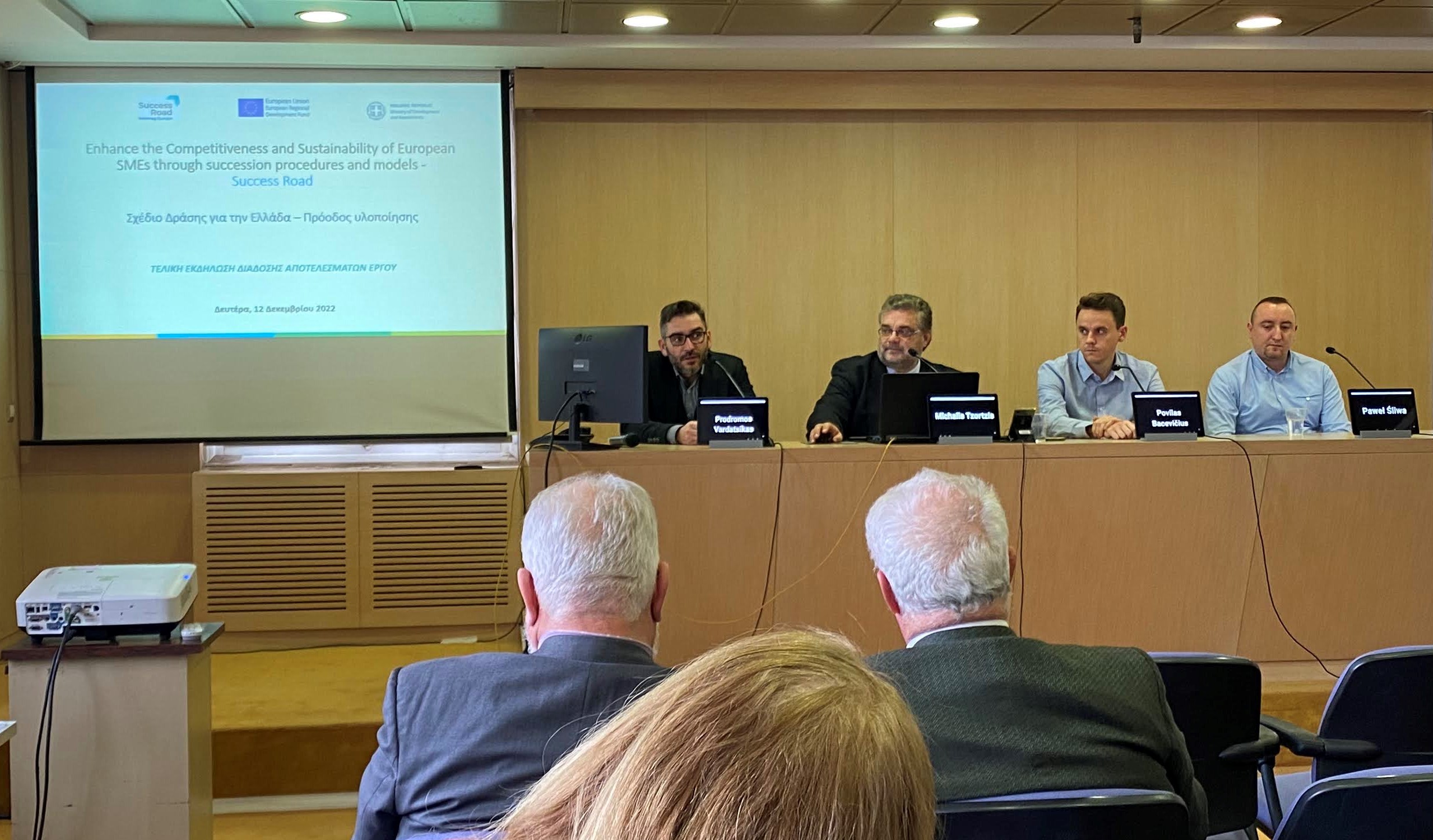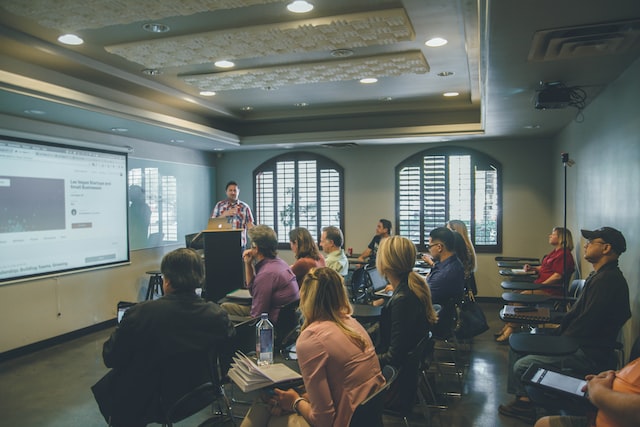
The final Road to Success for Family Businesses
Last month, the Interreg Europe Success Road project outputs were presented in an international event in Athens.
Statistics reveal that succession of business ownership between generations can be a life -or-death situation for many companies in Europe: only 30% of family-owned businesses survive the transition to a second generation while only 10% of them can overcome the transition to a third generation.
Success Road will address this challenge by helping manufacturing companies of the textile, clothing and footwear sectors prepare and manage their succession, both in the context of family successions and when selling to third parties.
The project overall objective is to help project national and regional authorities implement policies and new succession measures in their operational programmes so that SMEs can better face the succession phase and secure their future after a change of ownership. Working to strengthen the overall sustainability and long-term viability of European SMEs will further contribute to the growth of the economy by preserving jobs and boosting economic growth.
Objectives
• To analyse the gaps between the current and the desired state of successions and transfers of companies and examine the parameters and obstacles at play.
• To sensitise regional and local policymakers and civil servants about the problems and risks of the succession process in order to foster the creation of tools to help business owners withstand the succession process.
• To shape a business-friendly legal and institutional ecosystem by creating incentives and removing barriers to entrepreuneurship.
€827,271.00
SME competitiveness
• Capacity building of partners' key staff, stakeholders and policy makers through Interregional Workshops, Local Stakeholder Groups meetings and Staff Exchanges which will enhance their ability to identify and meet policy instrument improvement challenges.
• Development of 4 integrated regional Action Plans with the support of stakeholders and in collaboration with regional authorities in order to propose changes and measures for a smooth transfer and succession process.
• 4 Policy Learning Guidelines on identified priority themes in order to improve policy instruments, ensure a sustainable regional development and influence policymakers in other regions.
• Improvement of 4 Policy Instruments in Greece, Lithuania, Poland and Spain.
The Regional Innovation Strategy (RIS) for Mazovia is a document which reflects the quadruple helix approach in the Mazovia region. The first Regional Innovation Strategy for Mazovia (RIS Mazovia) was adopted in 2008. Its main aim was to create an innovation support system by, inter alia, building and maintaining cooperation networks and creating stable tools for supporting innovative activities. On the European level, the strategic concept for innovation development in the 2014–2020 programming period is outlined in the EU economic strategy – “Europe 2020” and a flagship initiative – “Innovation Union”. In both cases one of the elements identified as essential is the need for regions to undertake direct actions supporting initiatives favourable to creating a business environment and stimulating companies’ innovativeness which should lead to increasing their competetitiveness as well as that of the region. In response to such indications on the European level, in 2015 the updated version of RIS Mazovia was prepared. The Regional Innovation Strategy for Mazovia 2020, elaborated in accordance with the European Commission’s guidelines, was updated to include strategies for smart specialisation which meant enhancing the role of stakeholders in programming, implementation, monitoring and evaluation.
The objective of the instrument is to support the capacity of SMEs to grow in regional, national and international markets and to increase their innovation and productivity. The part of this instrument that could be specifically selected for this project is related to the support for the digitalisation of SMEs, where SMEs are supported to implement different novel solutions to increase their productivity and competitiveness. The first call for proposals of the financial measure “Industry digitalisation“ was launched recently.
It would be important to incorporate the aspect of resilience into the policy instrument in order to provide the extra support to the regions, which are experiencing major closures and structural changes. Thus, international cooperation and exchange of good practices is very useful in order to learn from other regions and get the knowledge how this policy instrument can be improved.
The OP should substantially contribute to the proposed shift in the growth model of the Greek economy from non-tradeable into tradeable sectors, and cluster development of innovative and out turned sectors with a sustainable competitive advantage. The pivotal strategic objective is to enhance the competitiveness and extroversion of enterprises, to facilitate transition to quality entrepreneurship with innovation and the growth of domestic added value as the cutting edge.The goal is to improve the first priority "Enhancing entrepreneurship with sectorial priorities" increase research potential and private investments in research and development, promote innovation and outturn of SMEs, particularly in textile and clothing sector.The program itself support development of business models, improvement of development of business processes, value chains, optimisation of innovation potentials of SMEs. The specific topic of transfer of business is not tackled directly by the programme. Existing support measures do not support the transfer of business and its specific questions and development challenges of SMEs facing with transfer of business. Therefore existing SME support measures shall be upgraded and develop approaches that can be used to foster the transfer of business and at the same time improve the cooperation between support organisations and SMEs in their endeavours to pay specific attention to the needs of SMEs in the process or in the preparation phase for transfer of business.
The Programme aims to boost economic growth in the Valencia region and contribute to achieving the Europe 2020 targets for smart, sustainable and inclusive growth. It should create jobs and boost productivity, particularly in SMEs. Especially, the T.O.3 SMEs Competitiveness. The Valencian economy and society have registered important advanc so that the region has become part of the more developed regions of Spain. However, despite the favorable trajectory in terms of production and employment registered during the last expansive phase, the negative effects of the current crisis have been reflected in its economic and productive model, highlighting structural failures that they require a strategic intervention and a new socio-economic paradigm. In this way, the objective of the improvement required, is to concentrate resources in those sectors of greater value added for the Region as the Footwear sector, to consolidate their development model around smart growth, enhancing those activities where the region has a specialization and a higher qualification accentuated, while taking into account the territory as a factor of competitiveness.

Last month, the Interreg Europe Success Road project outputs were presented in an international event in Athens.

Nupur Pavan Bag is the Associate Director at the Thomas Schmidhejny Center for the Family Enterprise and Simran Senani is a senior consultant at BAF Consultants...

Matt Allen is a Professor of Family Business at the Institute for Family Entrepreneurship (Babson College). Due to his role, parents constantly address him ques...

US statistics on family businesses show that, in the last five years, only 19% transition to second-generation leaderships. The 2021 Family Business Survey by P...

In the article from Harvard Business Review we suggest you today, Prof. James Vardaman and Dr. Will Tabor focus on the need of family businesses to retain nonfa...

Business transfer to the next generation is a complex task, requiring strong abilities to strike the right balance between different interests: the business its...

One of the first decisions a family-business entrepreneur must make when it comes to succession to the next generation is whether to sell or gift the company. I...

After seeing the state of family businesses in the MENA region, today we focus on Germany!
The recent study Impact of COVID-19 on family business performance: ...

As already presented in our previous article, The regenerative power of family businesses - Transgenerational entrepreneurship is the title of the 2022 Global F...

It is a fact that the most famous and successful companies worldwide are family businesses. Walmart, Volkswagen and Berkshire Hathaway are just a few examples.
...